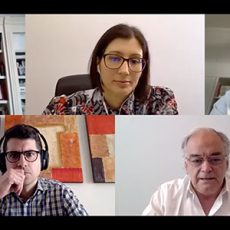
A school year begins in September in which the educational community intends to leave the effects of the COVID-19 pandemic in the background and focus on what really matters: the education of citizens and professionals adapted to the challenges of a complex and technologised world.
It’s a good time to reflect on the digitalisation of education, and on the advantages and risks in this inevitable process. The fact that networks, devices, businesses, and institutions are capable of pushing the limits in education is undoubtedly magnificent news, but this reality mustn’t cancel out a critical spirit. Faced with the dominant techno-optimism, we should approach the use of digital technologies in the educational system critically. The goal is their informed and perfectly-connected use with the different teaching projects.
The big tech companies, like Google and Microsoft, have long seen a major business opportunity in the educational world. Also, voracious Amazon wants its slice of the pie and doesn’t hesitate to launch campaigns that, under the guise of helping the educational community, are actually a skilful marketing tool, such as “Un click para el cole” in Spain or ‘Un click per la scuola” in Italy. But the debate should go far beyond discount coupons. What is at stake is how to squeeze the full potential out of the digitalisation of education, capable of building more open, free, and prosperous societies, without turning it into another giant source of data that feeds the semi-oligopoly of the big tech companies.
This is the risk, and it’s growing stronger: driven by the pandemic, technological platforms are taking control of students’ information, massively extracting their data, data that has enormous economic value. The alternative is open source platforms, built with significant participation from the educational community. Some good projects along these lines, such as Guadalinex, promoted by the Regional Government of Andalusia (Spain), were left to die in spite of their importance and potential.
Once again, it seems that the big tech companies are skilfully exercising their enormous ability to convince us that their products, extremely well-built, are essential and inevitable. Technology is omnipotent, and it makes everything better, or so they tell us. And it projects an image of modernity, which leads many educational centres, without the necessary reflection, to commit to solutions like tablets or the platforms from Microsoft or Google. It doesn’t matter if the results are good or bad; what matters is that the school seems to be at the forefront.
Meanwhile, what happens in the back rooms of these platforms remains in the dark. We know who our children’s teachers are, what subjects they take, the names of their schoolmates, and the books they have to read. But we have no idea what happens to their data and what the platforms are doing with it.
Technology is a very powerful tool for improving education, but we need to have a more critical spirit. Without giving up any of its possibilities, we have to avoid the trap of artificial dependence. The aim of education is to shape citizens who are free, critical, and prepared to live in society; not to do even more business at the expense of our data.




